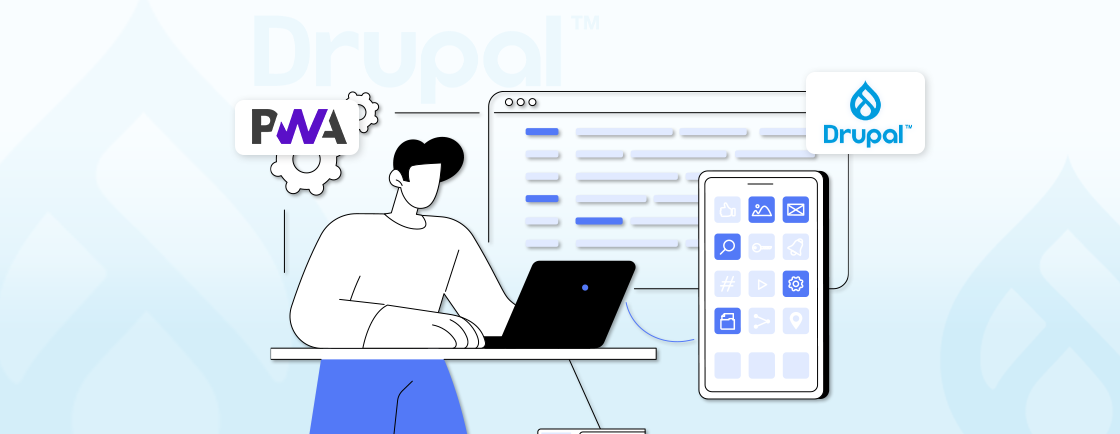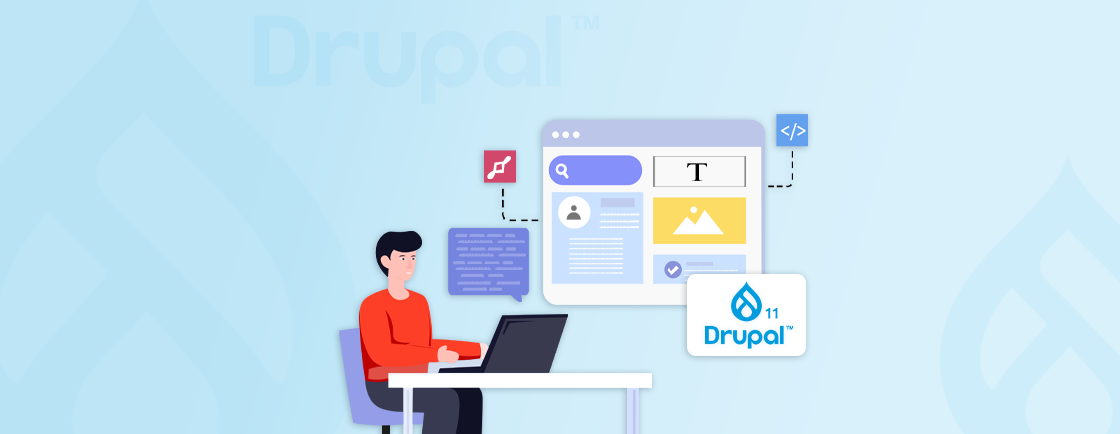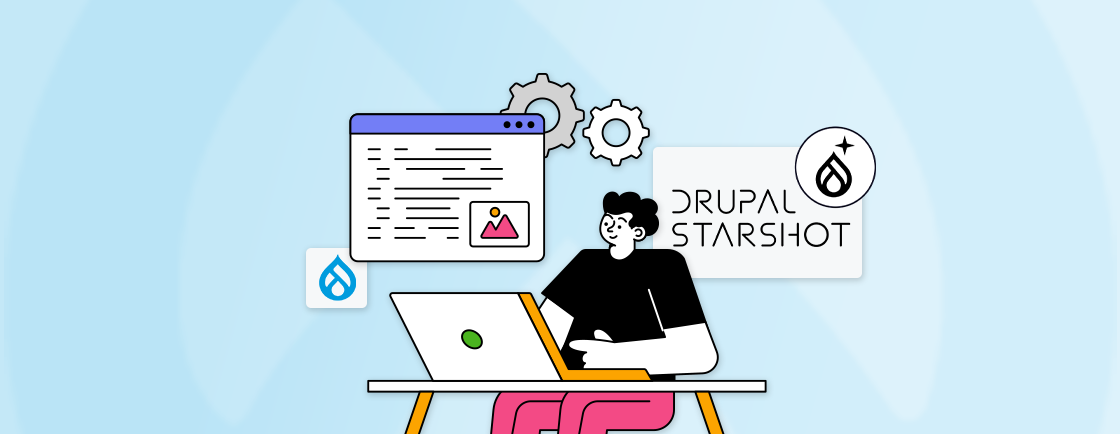Table of Contents
Imagine an all-inclusive construction store, where you can find everything needed to build a house. You’ll enter the store bare handed and come out with a complete house just waiting to be assembled. That’s sort of how Drupal works for websites. Drupal is one of the best content management systems, acting as the foundation and framework for your website.
Now, as beneficial as this CMS is, you need good skills and expertise to make the best of Drupal for building the best websites. For that, you can hire the best Drupal developers.
But what should you look for in a Drupal developer and how to hire the best one. We’ll discuss it in this blog.
Who is a Drupal Developer?
A Drupal developer builds and manages websites with Drupal, a powerful open-source CMS. Their expertise in PHP allows them to craft custom features, integrate external services, and optimize website performance. They are also design ninjas, customizing themes to create a visually stunning user experience.
This blend of coding prowess and design sense makes Drupal developers highly sought-after. They are in-demand for building secure and scalable websites for government institutions, universities, and large organizations with complex needs.
What Does a Drupal Developer Do?
A Drupal developer is a web professional who builds, expands, and maintains websites using the Drupal platform. They combine programming skills with an understanding of content management systems (CMS) to bring websites to life. But beyond creating the websites, here’s a breakdown of their key tasks:
- Crafting custom features: Using PHP, they create modules that extend Drupal’s core functionality, adding features specific to a website’s needs.
- Ensuring security & performance: Drupal developers prioritize website security by keeping the platform updated and implementing best practices. They also fine-tune performance for fast loading times.
- Integrating external tools: They seamlessly connect Drupal with external services like payment gateways or marketing platforms.
- Designing the look & feel: While Drupal offers themes, developers can customize them or build new ones to achieve the desired visual identity for the website.
- Making it mobile-friendly: They ensure the website adapts to different screen sizes and devices. So the user experience is smooth on desktops, tablets, and phones.
In essence, Drupal development experts are like architects and engineers for complex websites. They combine technical expertise with an understanding of user experience to create powerful, secure, and visually appealing online experiences.
Key Skills of a Drupal Developer
The best Drupal developers possess a unique blend of technical and core CMS skills to make sure the website looks and works as best as possible. Let’s take a look at their key skills.
Drupal CMS Skills
First off, the developer needs to be proficient with the core Drupal skills for basic website development and management.
- Drupal Core Knowledge: A strong understanding of Drupal’s core functionalities, modules, themes, and best practices for secure and scalable development is essential.
- Module Development: The best Drupal developer should be able to create custom modules using Drupal API. So they can extend functionalities and cater to specific project requirements.
- Theming: Drupal offers theming capabilities to customize the website’s visual appearance. Developers can leverage this to create unique themes or modify existing ones to achieve the desired design.
- Understanding of Views & Layouts: Views are a powerful Drupal feature for creating dynamic content displays. Familiarity with the Views layout allows developers to structure and present website content effectively.
- Experience with Drush: Drush is a command-line shell and scripting toolkit for Drupal. Proficiency in Drush helps automate repetitive tasks, manage configurations, and streamline development workflows.
Technical Skills
Besides the core CMS skills, the best Drupal experts should be familiar with the top frontend and backend skills. So the website looks and feels good and functions well.
Frontend
The frontend skills help with everything that the users can see and interact with, i.e the UI/UX.
- HTML, CSS & JavaScript: Solid knowledge of these foundational web development languages is critical. It helps build the best user interfaces and interactive elements on the website.
- Experience with CSS Frameworks (Optional): Familiarity with frameworks like Bootstrap or Tailwind CSS can streamline the front-end development process.
- Basic Understanding of Accessibility: Building websites that are usable by everyone is important. A grasp of accessibility best practices is beneficial.
Backend
The backend skills help handle everything working behind the scenes of a website or web app.
- Programming Languages: Drupal has a strong foundation in PHP, one of the best programming languages. In fact, this CMS is built on PHP. Familiarity with related frameworks like Symfony, which underpins Drupal, can also be beneficial.
- Database Management: Understanding how Drupal interacts with databases is important, especially for tasks like optimizing queries and ensuring data integrity.
- API Integration: The ability to integrate Drupal with external APIs allows for seamless connection to various third-party services.
Other than these technical skills, there are some skills that will help improve the Drupal website comprehensively.
Additional Skills
These skills are meant to be used as means to ease the development process through automation and optimization.
- Version Control Systems (VCS): Since collaboration is key, proficiency in version control systems like Git is crucial. It helps manage code changes, track revisions, and work effectively with other developers.
- Command Line Interface (CLI): Comfort with the command line allows for automation of repetitive tasks, server administration, and efficient development workflows.
- Problem-Solving & Analytical Skills: Debugging issues, troubleshooting challenges, and finding creative solutions are everyday tasks for a Drupal developer.
- Communication & Collaboration: Working effectively with designers, content creators, and other developers requires clear communication and collaboration skills.
By mastering this combination of skills, a Drupal developer becomes a valuable asset for building powerful and innovative websites. If you want these skills for your project, you can also consult with a Drupal development company. They have a team of developers and designers to help you create the best websites effectively.
How to Hire a Drupal Developer?
Hiring a Drupal developer requires a strategic approach to ensure you find the right candidate. Their skills and experience should complement your project and other team members (if any). Here’s how you can hire a Drupal developer:
Step 1: Define Your Project Requirements
To start with, you need to lay the groundwork. Clearly outline the features and functionalities you need in the Drupal website. Also specify the necessary Drupal skills like theming, module development, etc. Plus, define your budget and timeline for project completion.
Step 2: Craft a Detailed Job Description
A job description stays true to its words. It showcases what you’re looking for in the candidate, along with being an ad to attract the right fit. In the JD, give a brief on your project (including the budget and timeline, if possible).
Write about the technical skills needed in the project along with the eligibility criteria (if the project demands). You can also talk about your company culture to entice the candidates.
Step 3: Explore the Hiring Resources
Cast a wide net! There are several websites and portals where you can find the best Drupal developers. Some common ones include LinkedIn, Upwork, and Fiverr.
You can also partner up with professional Drupal development services for a team-based approach. Post the job description on these job boards and wait for the interested candidates to submit their portfolios.
Step 4: Evaluate the Developers’ Skills and Experience
Put their skills to the test! Evaluate their skills and experience from the portfolio. To gauge their technical expertise, you can also give them small assignments. Use coding assessments or portfolio reviews to gauge their Drupal expertise.
In their portfolio, look at their past work and clients. See if they have worked on anything similar to your project. If not, give them more in-depth tests to see how they respond.
Step 5: Check the References
Try to get in touch with the candidate’s past clients and ask for their honest feedback on the developer’s performance. If the developer has worked with a client on a project similar to yours, ask the latter on how the developer fared in different situations. Also ask about their work ethics and skills.
PS: This step may not always be possible.
Step 6: Interview the Shortlisted Candidates
Now, after evaluating the portfolios and checking the references, it’s time to come face-to-face with the shortlisted candidates. Conduct in-depth interviews to discuss project details. Ask in-depth questions about their experience and approach to your specific project. Ensure they’re a good cultural fit for your team.
A few of the key questions to ask during the interview include:
- Can you walk me through your experience with Drupal? Which versions have you worked with?
- Have you developed custom Drupal modules or themes? Can you provide examples?
- How do you approach Drupal theming and frontend development?
- Can you describe a complex Drupal project you’ve worked on and your role in it?
- Have you experienced performance bottlenecks in Drupal projects? How did you address them?
- How do you stay updated with the latest developments and trends in the Drupal ecosystem?
- How do you approach communication and collaboration within a development team?
- What project management methodologies and tools have you used in Drupal projects?
You can also tailor the questions to specific aspects of your project or organization to ensure a comprehensive evaluation.
Step 7: Negotiate the Contract & Compensation
Now, ideally, you’re down to a handful of candidates (or maybe just the perfect one). So it’s time to finalize the agreement outlining the project deliverables, payment terms, and timelines.
Some of the critical details in the contract are
- Milestones
- Acceptance criteria for each deliverable
- Intellectual property ownership
- Dispute resolution procedures
- Termination clauses
A well-defined contract protects both you and the developer. That ensures a smooth working relationship and a successful project outcome.
Step 8: Onboard the Developer
After signing the contracts, all that’s left is onboarding. That means integrating the new developer into your team and ensuring they have everything they need to be successful on the project.
Grant them access to all the essential resources they’ll need to hit the ground running. Like, code repositories, development environments, design mockups, content assets, and more.
Plus, keep an open line of communication with them and set expectations for how you’ll collaborate throughout the project. Daily stand-up meetings, weekly reports, and project management tools like Slack would help.
This process can help you hire the best Drupal developers. But if your project demands more of a team effort and you lack the resources for it, our Drupal development agency would be of help.
Conclusion
A Drupal Developer is a professional who specializes in building websites and applications using the Drupal content management system. They are responsible for creating, customizing, and maintaining Drupal websites for clients.
To become a successful Drupal Developer, one needs to have knowledge of programming languages such as PHP, JavaScript, and HTML/CSS. They should also have a strong understanding of Drupal architecture, theming, and module development.
FAQs on Drupal Developers
What skills does a Drupal developer need?
A successful Drupal developer possesses a blend of technical skills (PHP, JavaScript, database management) and Drupal-specific expertise (module development, theming, Views). Additionally, problem-solving, communication, and collaboration skills are essential.
What is the average salary of a Drupal Developer?
According to Glassdoor, the average salary for a Drupal Developer in the United States is $85,000 per year. However, this can vary depending on experience, location, and company size.
What are the different types of Drupal Developers?
There are primarily three types of Drupal Developers: Front-end, Back-end, and Full-stack.
– Front-end Drupal Developers focus on the visual and user-facing aspects of a website.
– Back-end Drupal Developers handle the server-side and data management.
– Full-stack Drupal Developers have a combination of both front-end and back-end skills.
Unleash the Potential of Drupal
Access expert guides and insights to leverage Drupal for scalable and secure web solutions.





